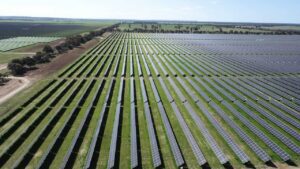Leaders in the EU and the UK have announced markedly different plans to manage the escalating energy crisis, as August power-prices in Europe soar to an all-time high and Putin vows to shutter the Nord Stream 1 pipeline until sanctions are lifted.
The newly-minted UK prime minister Liz Truss declined to follow the EU lead of a windfall tax on energy companies – tipped to make £170bn in windfall profits over the next two years in the UK alone – instead announcing a price cap on household energy bills, extra funding for energy suppliers, the scrapping of green levies and a lift on the fracking ban.
This means that while while energy companies in Europe will shoulder the financial burden of easing the crisis, the UK government will shoulder that burden itself, taking out billions in debt – some of which will help prop up the oil and gas sector.
Getting rid of the 150 green levy should mean that it raises to 2350 so what’s actually happening is @trussliz is giving energy companies another £150 pounds per bill on average all down to the taxpayer! https://t.co/4cbLJ5lEi8
— Tom Bradley (@tombradley95) September 8, 2022
Europe is particularly reliant on Russian gas, with the nation supplying some 45% of the EU’s total gas imports last year. While imports from Russia made up just 4% of the UK’s total gas supply in 2021, the country is still feeling the bite of the global surge in gas prices – that’s despite plans, announced earlier this year, to diminish reliance on Russian imports by building a robust network of fuel suppliers across the US, the Netherlands and the Gulf.
Truss’ decision to lift the moratorium on fracking, imposed in 2019 amid opposition from green groups and local concerns about earth tremors, suggests she will look to secure the UK’s energy supply by on-shoring more gas production – a move climate experts have previously strongly condemned – rather than ramping up renewables.
Cutting the green levy and increasing fracking, Liz Truss?
Did this summer not just happen? This summer that literally scorched the earth? Am I in a fever dream? pic.twitter.com/1EA6h2JJdI
— Hollerella (@hollerella) September 8, 2022
In the EU, President of the European Commission Ursula von der Leyen on Wednesday announced a suite of proposals to manage the escalating energy crisis, including windfall taxes on energy companies making soaring profits, mandatory electricity savings across European homes and businesses, and a cap on the price of Russian gas.
The European revenue cap will not just apply to fossil fuel companies. Under the scheme, renewable and nuclear energy suppliers will also face limits on their profits, with the proceeds going to help domestic consumers and companies pay their astronomical bills.
That’s because, under EU law, the price of electricity is based on the cost of the most expensive fuel – in this case the massively inflated price of gas – meaning usually cheap renewables are benefitting from a major, artificial price hike.
Across the English Channel it’s a different story, with Truss on Thursday announcing an Energy Price Guarantee (EPG), in place from October 1, that will discount the unit cost for gas and electricity, alongside a £40bn liquidity support package for energy companies coming into trouble as a result. Absent from the Truss announcement was any suggestion of capping energy company profits.
The new guarantee will include the temporary suspension of green levies, add-on fees that amount to about 8% of UK household energy bills (or £150 per household), and which are used to fund energy-efficiency schemes and other green initiatives. The move has been met with scepticism on Twitter, and welcomed by climate-sceptics.
Although re-assuring that Liz Truss has just affirmed in Parliament her support for the UK’s net-zero commitments, but I’m not sure that this is reflected in the decision to suspend the green levy. Will this also eliminate the Energy Companies Obligation? #EnergyPriceCap
— John Hefford (@johnhefford) September 8, 2022
According to Truss and energy secretary Jacob Rees-Mogg, the guarantee means that a typical household will pay no more than £2,500 per year for the next two years, saving the typical household £1,000 a year. It’ll be cold comfort for some families, given the pre-crisis energy bill for a typical British household was £1,200, but Truss says the intervention will curb inflation by up to five percentage points.
Deusche Bank estimates the energy price offset, alongside promised tax cuts, could cost the UK £179 billion, and UK Opposition leader Keir Starmer expressed concerns about an increase in borrowing.
In the same speech, Truss announced a review of how government can achieve net-zero in a vaguely-termed “pro-business and pro-growth” way, which will be headed up by Chris Skidmore, one of the Tory party’s most committed net-zero supporters.
Speaking with the Guardian, Skidmore said the review would look at how to incentivise businesses to go green and increase growth. The PM has tasked Skidmore with presenting his findings by the end of the year.
While Skidmore is an avowed net-zero devotee, many of Truss’s cabinet appointments have raised environmental eyebrows: new business and energy secretary Rees-Mogg has a long record of denialist rhetoric, while her new economic advisor, Matthew Sinclair, famously wrote a book decrying the “burgeoning climate change industry” and suggesting that humanity would be best placed getting used to new, high temperatures.










